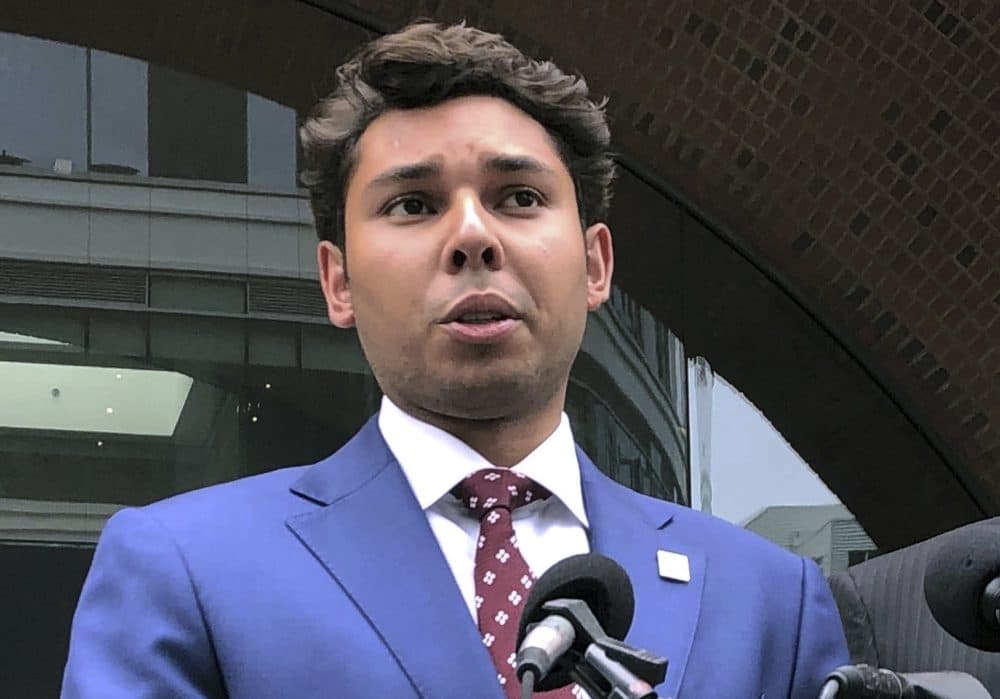Advertisement
Fall River Revising Policies Following Unexplained Charges On Mayor's Credit Card
Resume
Documents obtained through a public records request show a pattern of questionable spending by Fall River's embattled mayor, followed by inconsistent recordkeeping. As a result, the mayor’s expenses did not receive the same level of scrutiny as other city employees.
The Public’s Radio found a number of hotel reservations, flights and Uber rides where outgoing Mayor Jasiel Correia provided a receipt but no additional documentation describing the purpose of the trip.
“There are several undocumented charges that I don't know where the mayor went or why,” said Mary Sahady, the city’s director of financial services.
The 27-year-old mayor took a leave of absence last month following dozens of federal charges against him for allegedly extorting marijuana vendors. He’s also facing charges for defrauding investors in an app he started before becoming mayor.
Correia told The Public’s Radio he followed procedure by providing receipts to the finance department. And that’s because the mayor, unlike other city employees, isn’t required to submit a travel slip explaining why a particular trip is a city-related expense.
“There really isn't anyone that signs off on travel expenses or other types of purchases that go through the [mayor’s] credit card,” Sahady said.
Instead, the mayor’s travel expenses are, in a sense, approved and appropriated by the city council when they approve the department’s budget every year. Beyond that appropriation of funds, the mayor is free to travel somewhere without anyone signing off as long as it stays within budget.
James Wilkinson, a certified public accountant and partner at Marcum, LLP, says that process is flawed.
“In my experience that’s certainly not an allowable practice,” said Wilkinson, who specializes in audits of local municipalities. “Anything that gets charged against that appropriated budget amount should be able to be demonstrated as being city business.”
Providing adequate documentation is especially critical, Wilkinson says, when it comes to “risky transactions” like travel, meals, or anything that may cross over the line as being more personal in nature.
More documentation also provides better overall internal controls which translates into more transparency about how city officials spend taxpayer funds. A mystery surrounding the purchases of three iPhones since Correia took office provides a good example of this.
Correia told The Public’s Radio he made the purchase of the cell phones each costing around $1,300 using his credit card and would “never buy anything without telling the IT department.” He said he was told by someone at the department that the mayor “always gets the latest upgrades to phones.”
But financial director Sahady says “there’s no such policy” and that she was told a completely different story as to why the mayor purchased multiple cell phones.
Because of all the confusion, Sahady, in conjunction with Acting Mayor Cliff Ponte, is making a change to the city’s recordkeeping policies by creating new supplemental travel forms and additional documentation requirements for all city employees, including the mayor.
“We'll be putting in some policies at least that need to be, maybe not authorized, but at least completed so that we're not here a year from now having the same conversation,” Sahady said.
The city does not plan to reach out to mayor Correia about the questionable transactions as the books from previous years are closed and the current ones are under review.
This story is a production of New England News Collaborative. It was originally published by The Public's Radio (formerly Rhode Island Public Radio) on Nov. 22.
This segment aired on November 22, 2019.